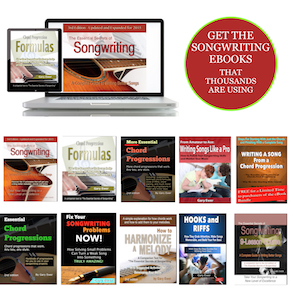 If you like the ideas in this blog, you’ll love “The Essential Secrets of Songwriting” 10-eBook Bundle. It shows you the best way forward to writing songs that will connect with your target audience.
If you like the ideas in this blog, you’ll love “The Essential Secrets of Songwriting” 10-eBook Bundle. It shows you the best way forward to writing songs that will connect with your target audience.
For those who are new to songwriting, do you sense a kind of fear when you consider even just starting a song? That fear may set in for any one of the following reasons:
- You find it hard to think of anything to write about.
- All your initial melody ideas sound a bit aimless.
- Your lyric ideas sound lame.
- You find yourself strumming the same kinds of chords with the same basic rhythm.
 So what do you do about that? It’s typical to get a kind of “blank page” syndrome: since everything you try to do results in stuff you don’t like (at least not right away), you don’t write anything. You’re staring at a blank page.
So what do you do about that? It’s typical to get a kind of “blank page” syndrome: since everything you try to do results in stuff you don’t like (at least not right away), you don’t write anything. You’re staring at a blank page.
Good songwriting is a combination of two activities, and this applies regardless of how long you’ve been writing songs:
- Imagining musical fragments and then assembling them — putting them together.
- Fixing those assembled parts until they all “play nice” with each other.
The Blank Page
Sometimes, you can write a beauty. It all comes together astonishingly well, and you love what you’ve done. Step 1 has been a winner, and you hardly have to even consider doing Step 2.
But sometimes it can feel that every idea you come up with sounds like a dud. So you respond by doing nothing. That’s blank page syndrome.
Here’s the problem with a blank page: there’s nothing to fix. Because you’ve not done Step 1 — imagining and assembling musical ideas — you can’t do Step 2: fixing.
So what should you be doing about this? Surely I’m not suggesting that you write complete garbage down?
 Yes, that’s exactly what I’m suggesting. Get those first ideas going, however lame they may seem to your ears. Get something written down or recorded. If, as you grunt out your first melodic ideas, the lyrics aren’t happening, make up words, syllables, or just hum. Get a basic chord progression going, and just do it.
Yes, that’s exactly what I’m suggesting. Get those first ideas going, however lame they may seem to your ears. Get something written down or recorded. If, as you grunt out your first melodic ideas, the lyrics aren’t happening, make up words, syllables, or just hum. Get a basic chord progression going, and just do it.
The point is, if you haven’t done Step 1, you can’t do Step 2. So once you have your Step 1 completed, or even just partially there, you’ve now got something you can fix.
No one will hear the Step 1 stage of your process, so don’t worry about how bad it sounds. You may find, after fixing what you’ve written in that stage, that almost nothing remains of your original ideas: you’ve pretty much changed it all.
But the point is that you would have never been able to fix it if you hadn’t done that initial step of getting something written.
So stop staring at an empty page – Get SOMETHING written or recorded. You’ve got all the time in the world to fix it.
 Written by Gary Ewer. Follow Gary on Twitter.
Written by Gary Ewer. Follow Gary on Twitter.
 “Hooks and Riffs: How They Grab Attention, Make Songs Memorable, and Build Your Fan Base“, is available at “The Essential Secrets of Songwriting” Online Store. Get it separately, or as part of 10-eBook Bundle, along with a FREE chord progression eBook.
“Hooks and Riffs: How They Grab Attention, Make Songs Memorable, and Build Your Fan Base“, is available at “The Essential Secrets of Songwriting” Online Store. Get it separately, or as part of 10-eBook Bundle, along with a FREE chord progression eBook.











Pingback: Can Songwriting Abilities Vanish? | The Essential Secrets of Songwriting
Most learning song writers think they are ready for the big time , simply because
they dont understand , how to right even an average song.
Many Pro writers are in that position because they had the intelligence to
learn from others who made it by devotion and hard work
As usual Gary Ewer tells it like it is there are no short cuts to success